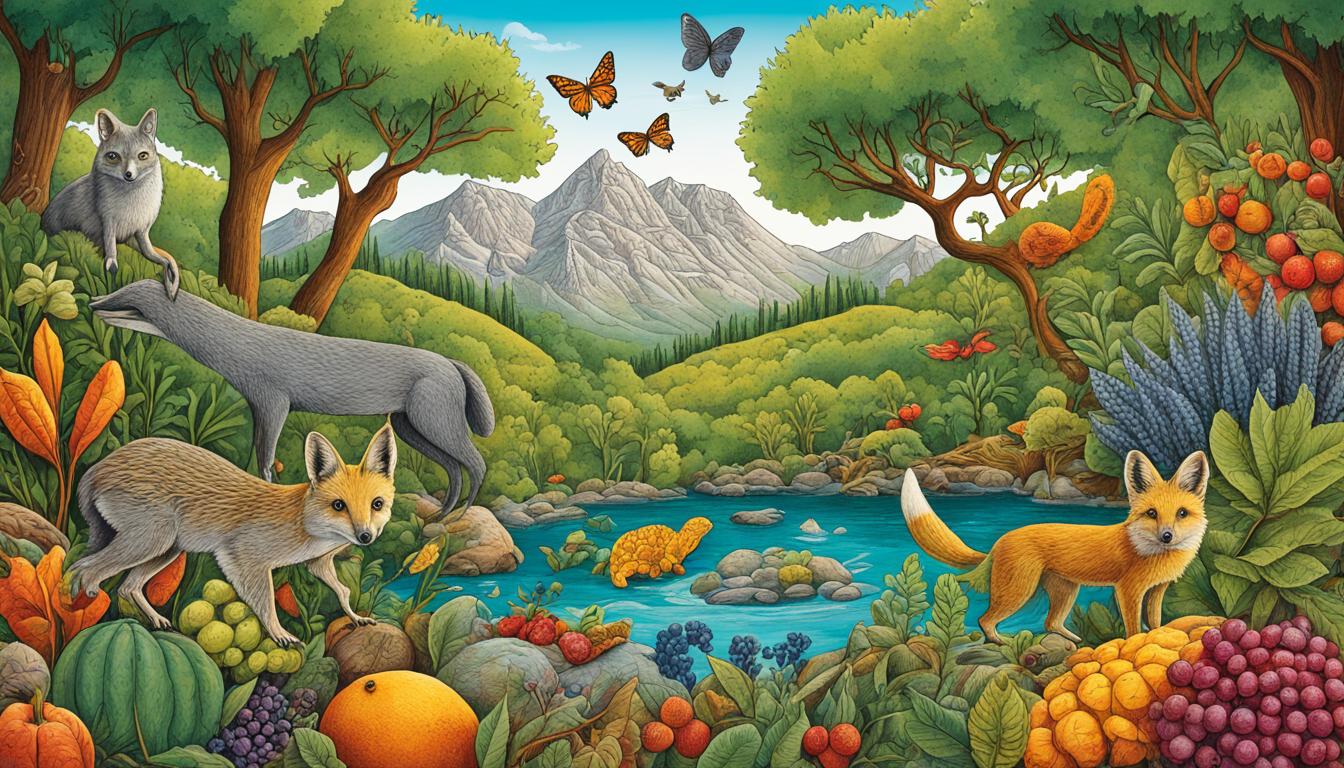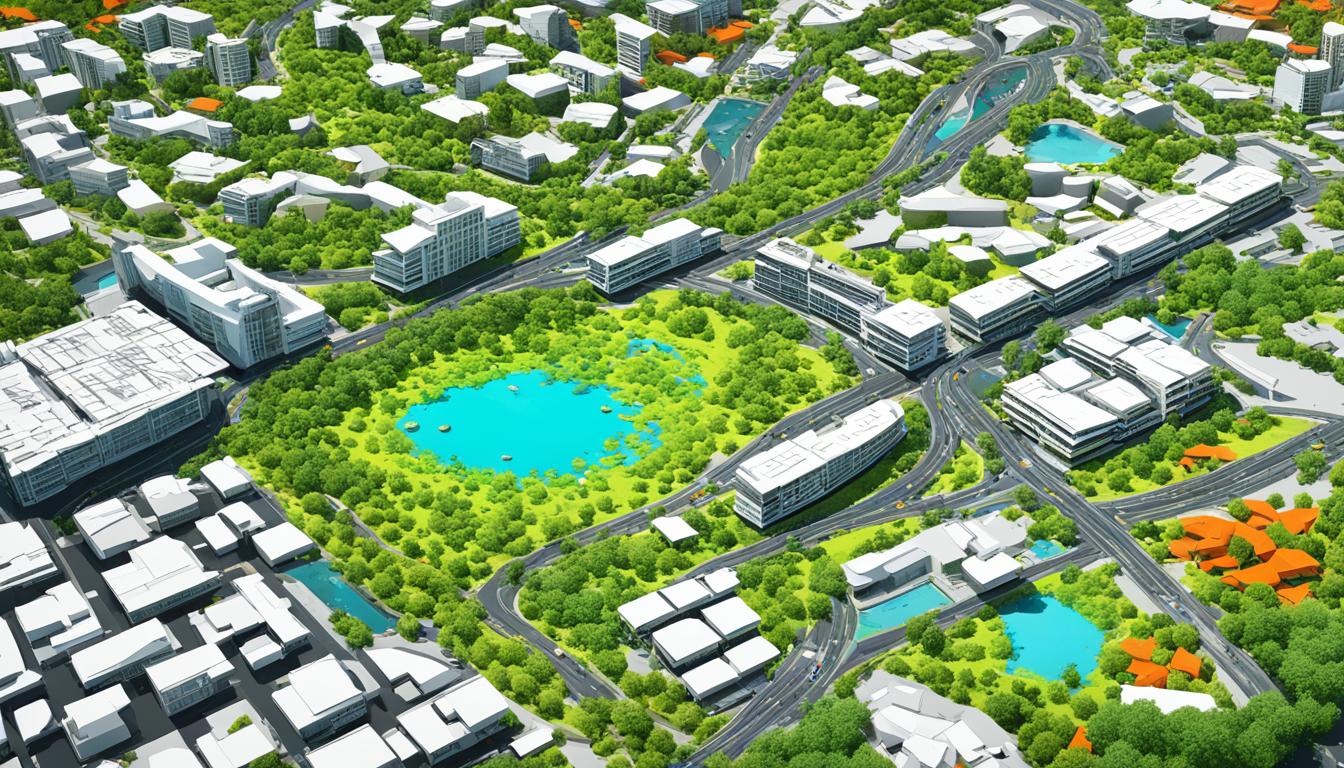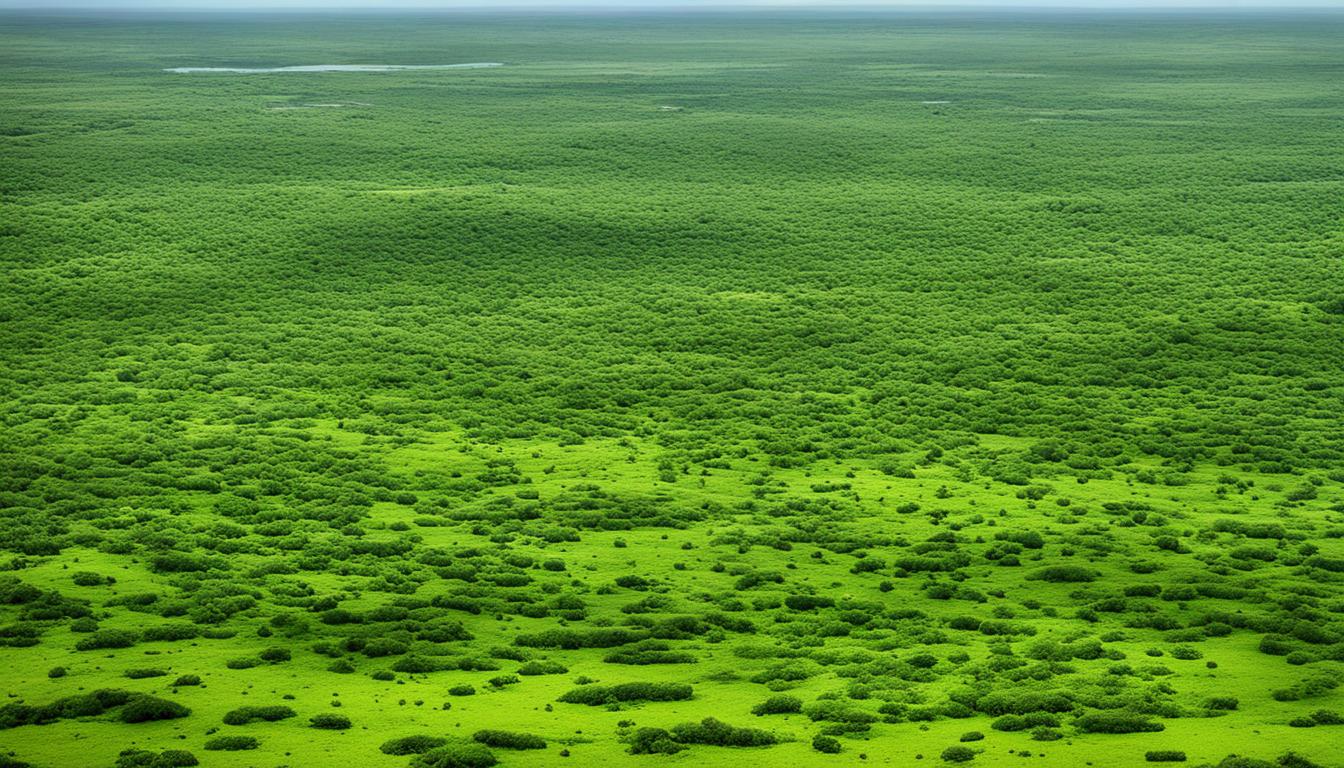Ghana Biodiversity: Animal and Plant Species and What Is Under Threat
Did you know that Ghana, located in West Africa, is home to a stunning array of biodiversity? From fascinating flora to diverse fauna, Ghana boasts a rich natural heritage. With over 3,600 species of flora, including the indigenous West African cycad, Ghana is a hotspot of plant diversity.
But the biodiversity in Ghana is under threat. Many animal and plant species are facing risks of extinction due to various challenges such as habitat degradation, over-exploitation of resources, and climate change. It is crucial to understand the significance of Ghana’s biodiversity and the urgent need to protect it.
Key Takeaways:
- Ghana is home to a diverse range of animal and plant species.
- Threats to biodiversity in Ghana include habitat degradation, over-exploitation of resources, and climate change.
- Conservation efforts in Ghana aim to protect the country’s biodiversity and promote sustainable development.
- Greater coordination, research, and resource mobilization are needed to effectively conserve Ghana’s biodiversity.
- Protecting Ghana’s biodiversity is essential for the well-being of the environment and local communities.
Flora Diversity in Ghana
Ghana is known for its remarkable flora diversity, boasting over 3,600 species of flora that encompass major taxonomic groups. This rich biodiversity can be attributed to the country’s diverse ecosystems and favorable climate. One of the notable regions is the southwestern Ashanti-Kwahu Plain, characterized by its wet evergreen forests, which exhibit the highest level of endemism and species richness in Ghana.
The flora of Ghana showcases a variety of indigenous species that are unique to the region, including the enchanting West African cycad and the impressive Encephalartos barteri, a gymnosperm. These native plants contribute to the country’s biodiversity and hold significant ecological value.
However, the sustainability of certain species is concerning. Mahogany and Odum, for instance, face the threat of unsustainable exploitation and deforestation. It is vital for the conservation efforts in Ghana to address these challenges and protect the indigenous flora from further decline.
Fauna Diversity in Ghana
Ghana is home to a wide variety of fauna, including amphibians, reptiles, birds, and mammals. The country boasts an impressive biodiversity with 221 recorded species of amphibians and reptiles, 728 species of birds, and 225 mammalian species. Ghana’s diverse ecosystems provide habitats for a range of unique and fascinating species.
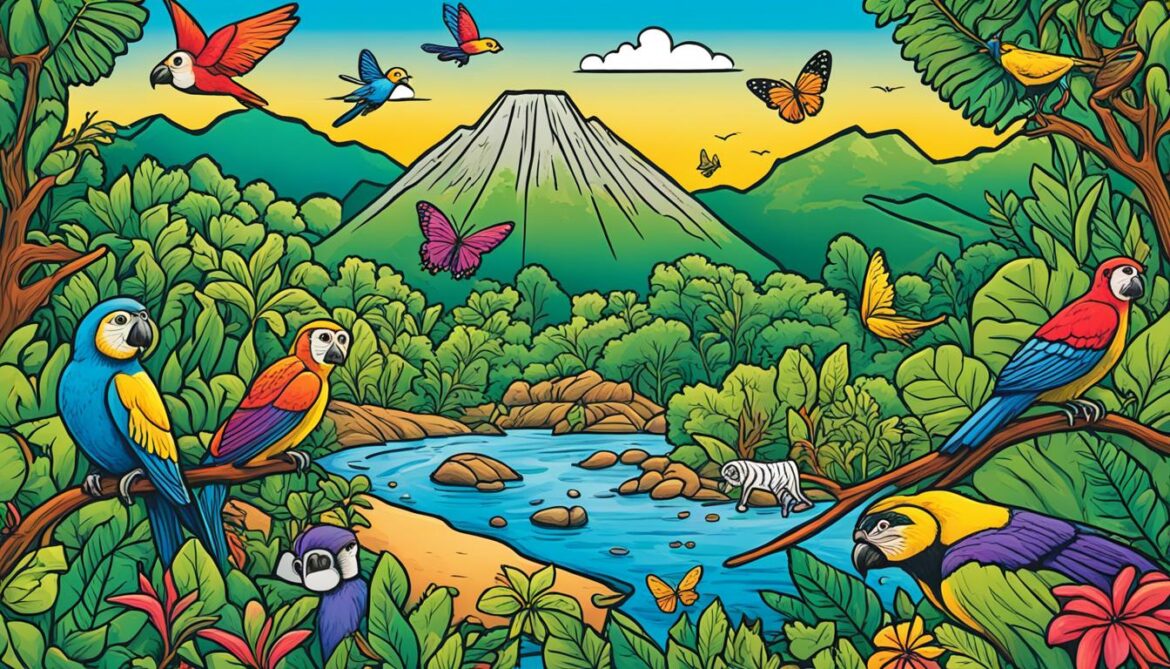
Endemic species, such as the frogs Hyperolius baumanni and lizards Agama sylvanus, are found in the Bia Forest Reserve and Atewa Range Forest Reserve. These reserves are home to a rich variety of flora and fauna, making them important areas for biodiversity conservation in the country.
Bird Conservation in Ghana
Ghana is also significant for bird conservation, with several threatened species and high levels of endemism. The country’s diverse habitats support a wide range of bird species, including migratory birds that travel long distances to breed or overwinter. The presence of these birds indicates the health and importance of the habitats they rely on.
“Ghana’s diverse ecosystems support a rich variety of bird species, making it an important destination for avian enthusiasts and researchers alike.”
Threatened Species in Ghana
Despite its rich biodiversity, Ghana faces the challenge of protecting its threatened species. Several bird species, along with marine turtles and crocodiles, are among the threatened fauna in Ghana. Conservation efforts are crucial to prevent the further decline of these species and maintain the delicate balance of the country’s ecosystems.
| Category | Number of Species |
|---|---|
| Amphibians and Reptiles | 221 |
| Birds | 728 |
| Mammals | 225 |
Ghana’s rich fauna diversity showcases the country’s commitment to biodiversity conservation and its importance on a global scale.
Threats to Biodiversity in Ghana
Ghana’s rich biodiversity is under constant threat from various factors. These include land-use conversions, habitat degradation, over-exploitation, invasive alien species, climate change, predation, wildfires, and poaching that collectively exert pressure on the country’s delicate ecosystems.
Land-Use Conversions and Habitat Degradation
The expansion of large-scale farming and mono-cultural plantations in Ghana leads to extensive land-use conversions, resulting in the loss of natural habitats for many species. Additionally, pollution, fire misuse, and chemical misapplication contribute to habitat degradation, disrupting the delicate balance within ecosystems.
Over-Exploitation of Natural Resources
In an attempt to meet increasing demands, Ghana faces challenges related to the over-exploitation of its valuable natural resources. Excessive logging and unsustainable fishing practices threaten the stability and resilience of ecosystems, undermining the long-term survival of many species.
Invasive Alien Species
The introduction and spread of invasive alien species pose a significant threat to Ghana’s biodiversity. Species such as Choromolaena odorata and water hyacinth outcompete native flora, altering ecosystems and negatively impacting indigenous species that rely on specific habitats and resources.
“The invasion of alien species can cause significant disruptions to native ecosystems, leading to a loss of biodiversity and changes in ecosystem functions.” – Dr. Kwame Agyei, Ecologist
Climate Change Effects
Ghana’s biodiversity is also susceptible to the adverse effects of climate change. The rising temperatures, changing rainfall patterns, and extreme weather events associated with climate change pose challenges to the survival and adaptation of many species, particularly those with specialized requirements.
To illustrate these threats to Ghana’s biodiversity, consider the following table:
| Threat | Description |
|---|---|
| Land-Use Conversions | The conversion of natural habitats for agricultural purposes and mono-cultural plantations. |
| Habitat Degradation | The deterioration of ecosystems due to pollution, fire misuse, and chemical misapplication. |
| Over-Exploitation | The unsustainable extraction of natural resources, including logging and fishing practices. |
| Invasive Alien Species | The introduction and spread of non-native species that disrupt native ecosystems. |
| Climate Change | The impacts of changing climatic conditions on biodiversity and ecosystem stability. |
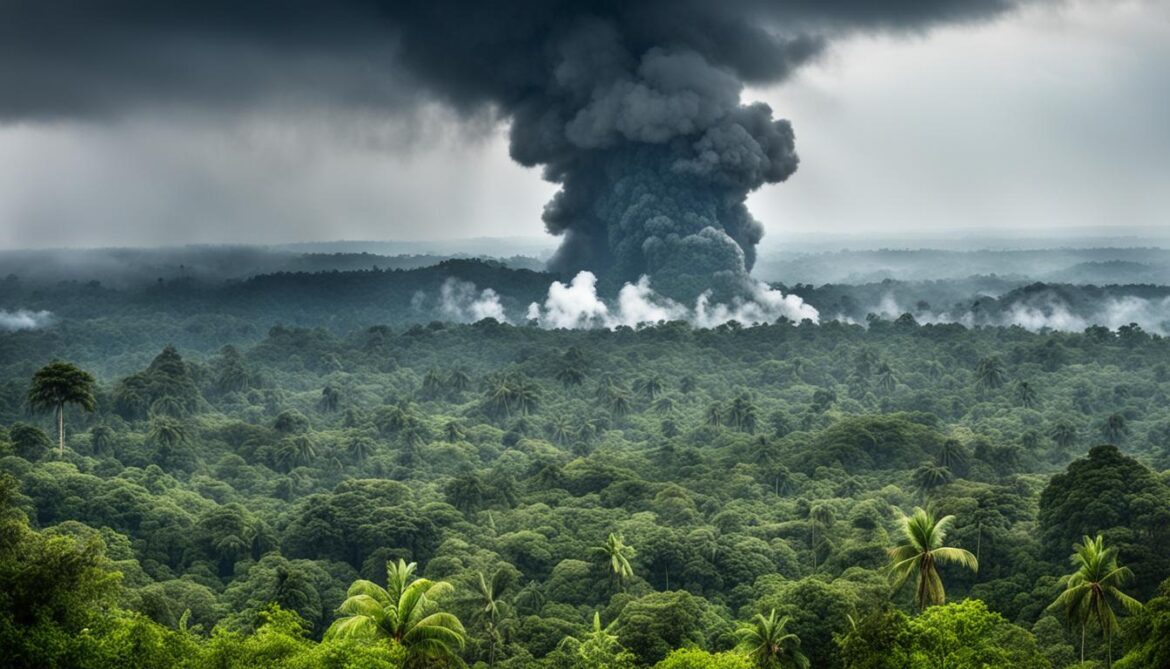
Ghana’s biodiversity faces a myriad of threats, and addressing these challenges requires a comprehensive and collaborative approach. Efforts to protect and preserve Ghana’s unique flora and fauna are crucial for maintaining the health of the country’s ecosystems, supporting sustainable development, and ensuring a harmonious coexistence between humans and the natural world.
Impacts of Climate Change on Biodiversity in Ghana
Ghana is currently experiencing the far-reaching consequences of climate change, including rising sea levels and extreme weather events such as droughts, floods, and high temperatures. These changes have a profound impact on the country’s rich biodiversity, threatening the delicate balance of ecosystems and the survival of numerous species.
Sea level rise poses a significant threat as it results in the intrusion of seawater into freshwater habitats, disrupting the natural equilibrium and endangering the survival of aquatic plants and animals. This intrusion not only affects coastal regions but also extends further inland, impacting freshwater ecosystems that are vital for numerous species.
Drought and high temperatures also have severe implications for biodiversity in Ghana. Prolonged droughts can lead to the drying up of rivers and wetlands, diminishing crucial water sources for both flora and fauna. These conditions make it challenging for plants to thrive and for animals to find sufficient food and shelter, ultimately endangering their survival.
Furthermore, climate change impacts marine ecosystems, particularly along the coastline of Ghana. Rising sea temperatures and ocean acidification jeopardize the survival of various marine species, including coral reefs and vital fish populations. The degradation of these ecosystems has far-reaching consequences for the overall health and diversity of marine life.
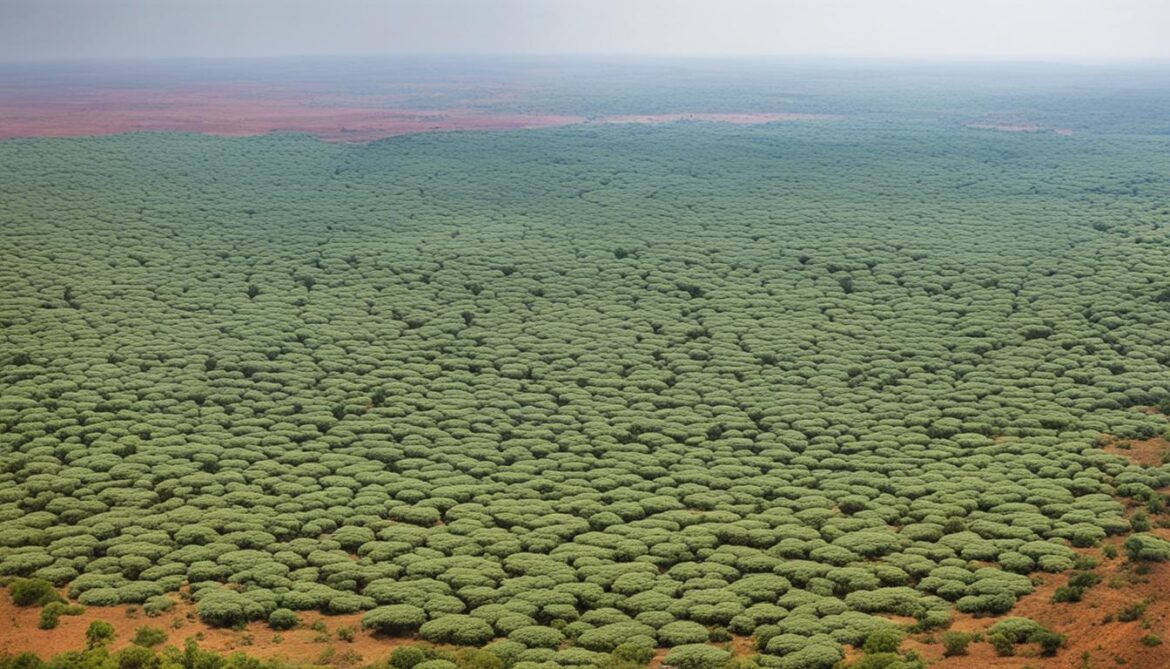
Key Impacts:
- Rising sea levels threaten freshwater habitats
- Droughts and high temperatures affect plant and animal survival
- Marine ecosystems face disruptions and decline
It is crucial to address the impacts of climate change on biodiversity in Ghana through effective conservation measures and sustainable practices. Protecting and restoring habitats, implementing climate change adaptation strategies, and promoting awareness and education are essential steps towards safeguarding Ghana’s unique and diverse ecosystems for future generations.
Conservation Efforts in Ghana
Ghana is committed to preserving its rich biodiversity through a range of conservation efforts. The country has designated protected areas, including forest reserves and conservation areas, to safeguard important habitats and protect vulnerable species. These protected areas serve as vital refuges for a diverse range of flora and fauna, supporting the ecological balance and promoting biodiversity conservation.
The government of Ghana recognizes the importance of integrating biodiversity considerations into development policies to ensure sustainable practices. Efforts have been made to promote sustainable development that takes into account the preservation of natural resources and the long-term well-being of ecosystems. The implementation of policies and guidelines for forestry, fisheries, and biotechnology aims to protect these valuable resources while fostering sustainable growth.
One significant initiative in Ghana is the establishment of forest reserves, which play a crucial role in biodiversity conservation. These reserves help maintain natural habitats, conserve indigenous species, and provide ecosystem services such as carbon sequestration, watershed protection, and climate regulation. Through active management and enforcement, Ghana strives to mitigate the threats to its biodiversity and create a sustainable future for its natural heritage.
“Biodiversity is essential for the health and resilience of ecosystems and for sustaining livelihoods. Ghana’s commitment to conservation and sustainable development is a testament to its recognition of the value of biodiversity in building a prosperous and resilient nation.” – Environmentalist Ghana Nature Trust
Ghana’s efforts in biodiversity conservation extend beyond protected areas. The government works closely with local communities, non-governmental organizations, and international partners to raise awareness about the importance of biodiversity and promote sustainable practices. Public education and community engagement are vital for fostering a sense of stewardship and empowering individuals to contribute to conservation efforts.
Protected Areas in Ghana
| Protected Area | Type | Size (ha) |
|---|---|---|
| Kakum National Park | National Park | 357,000 |
| Mole National Park | National Park | 4,577 |
| Boabeng-Fiema Monkey Sanctuary | Waiver | 19 |
| Ankasa Conservation Area | Conservation Area | 509 |
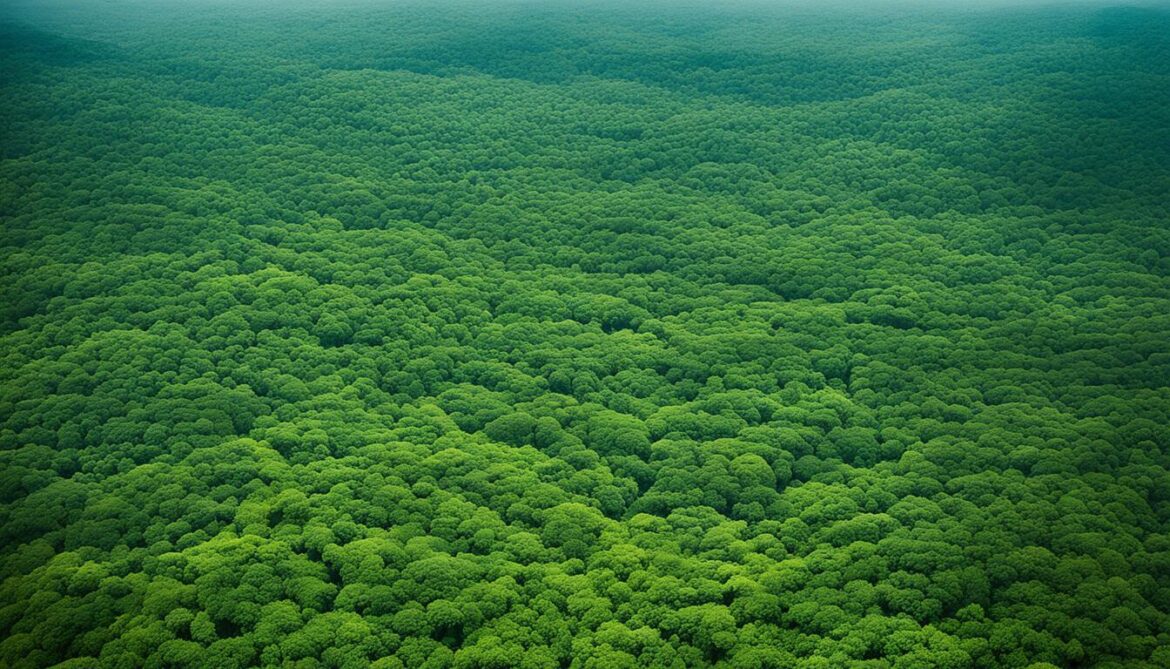
Ghana’s commitment to biodiversity conservation and sustainable development sets an example for other nations facing similar challenges. It serves as a reminder of the importance of protecting and preserving our natural heritage for future generations. By working together and implementing effective strategies, Ghana is paving the way for a harmonious coexistence between humans and the diverse ecosystems that support life on our planet.
Challenges to Biodiversity Conservation in Ghana
While Ghana has made efforts to conserve its biodiversity, numerous challenges persist. One of the main obstacles is the implementation of the National Biodiversity Strategy and Action Plan (NBSAP). The lack of coordination among biodiversity-related agreements hinders the effective execution of conservation initiatives.
In addition, inadequate resources pose a significant challenge. Insufficient funding and limited capacity hinder the implementation of biodiversity conservation measures throughout the country. Without adequate resources, it is challenging to carry out comprehensive research, develop effective strategies, and support conservation activities.
“The current NBSAP is deemed inadequate to address the existing threats to Ghana’s biodiversity,” says Dr. Kwame Amoako, a biodiversity conservation expert. “To overcome these challenges, there is a need for improved coordination, extensive research, public education, and awareness programs.”
The Importance of Improved Coordination
Enhancing coordination among different organizations and stakeholders is crucial to effective biodiversity conservation in Ghana. By fostering collaboration, sharing knowledge and resources, and aligning efforts, Ghana can maximize the impact of conservation strategies.
Investing in Research and Development
Investing in research is essential for understanding the complex dynamics of Ghana’s biodiversity and developing evidence-based strategies. By conducting comprehensive studies on threatened species, habitats, and ecosystem services, Ghana can make informed decisions and prioritize conservation efforts.
Public Education and Awareness
Public education and awareness play a key role in creating a culture of conservation in Ghana. By promoting the value of biodiversity and its importance for sustainable development, local communities can actively contribute to biodiversity conservation. Public awareness campaigns can educate individuals on sustainable practices and the need to protect Ghana’s rich natural heritage.
Ghana’s Atewa Range Forest Reserve
The Atewa Range Forest Reserve is one of Ghana’s most important and largest forests. Situated in the Eastern Region of the country, it spans approximately 26,000 hectares and is recognized as a biodiversity hotspot.
This biodiverse reserve is home to unique upland evergreen forests, which are characterized by their lush vegetation and rich ecosystem. These forests provide a habitat for a wide variety of flora and fauna, including many endemic species found nowhere else in the world.
The Atewa Range Forest Reserve plays a crucial role in providing essential ecosystem services. It acts as a natural water catchment area, supplying clean water to local communities and serving as a source of drinking water for wildlife and plants. The reserve also helps to regulate the local climate, mitigate the impact of climate change, and promote the overall well-being of the surrounding ecosystem.
However, the Atewa Range Forest Reserve faces significant threats to its biodiversity. Illegal logging activities pose a major risk, leading to deforestation and the destruction of habitats. Hunting activities, including poaching, further endanger the survival of vulnerable species within the reserve.
One of the most pressing threats to the Atewa Range Forest Reserve is the potential exploitation of bauxite deposits found in the area. Bauxite mining activities could result in irreversible environmental damage, including the loss of important forest cover and the disruption of ecological balance.
To address these challenges and preserve the unique biodiversity of the Atewa Range Forest Reserve, conservation efforts are underway. The Ghanaian government, in collaboration with local and international organizations, is implementing measures to protect the reserve and promote sustainable practices.
Conservation initiatives include the establishment of protected areas, the enforcement of anti-logging and anti-poaching regulations, and the promotion of community-based conservation projects. These efforts aim to strike a balance between safeguarding the forest’s biodiversity and ensuring the well-being and livelihoods of local communities.
It is crucial that these conservation efforts receive continued support and investment to secure a sustainable future for the Atewa Range Forest Reserve and its invaluable biodiversity.
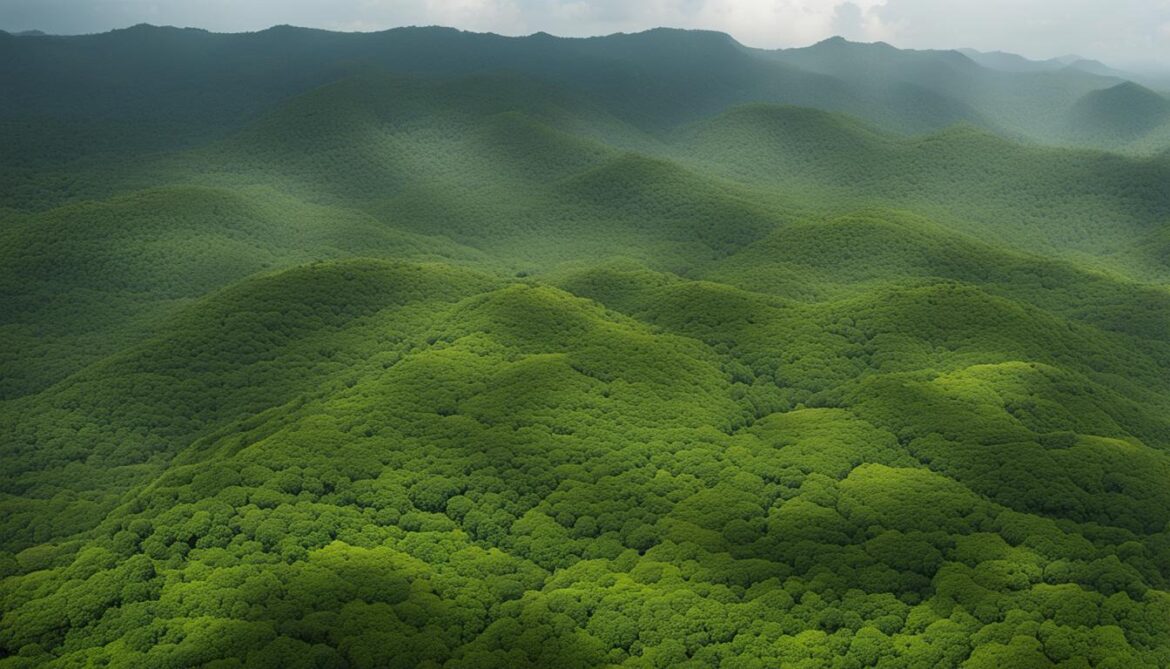
| Threats to the Atewa Range Forest Reserve | Impact |
|---|---|
| Illegal Logging | Deforestation, habitat destruction |
| Hunting and Poaching | Loss of vulnerable species |
| Bauxite Mining | Environmental damage, forest loss |
Flora and Fauna in the Atewa Range Forest Reserve
The Atewa Range Forest Reserve in Ghana is a haven for biodiversity, boasting a stunning array of flora and fauna that is both unique and significant for conservation efforts. The reserve’s lush, upland evergreen forest vegetation is home to an extraordinary variety of plant species, including rare and endemic types, making it a botanical wonderland.
Walking through the reserve, visitors will be greeted by towering trees, vibrant flower displays, and a symphony of bird songs. The Atewa Range Forest Reserve provides a vital habitat for diverse fauna, including several endangered species. Mammals such as the critically endangered Diana monkey and the rare African forest elephant find sanctuary within its boundaries.
The Atewa Range Forest Reserve’s extraordinary biological diversity and conservation significance make it a globally important site for protecting and preserving our planet’s biodiversity.
Efforts are underway to safeguard the flora and fauna of the Atewa Range Forest Reserve. Local and international conservation organizations are collaborating with the Ghanaian government to implement sustainable management practices that balance the preservation of the reserve’s unique vegetation with the needs and livelihoods of local communities.
A comprehensive biodiversity monitoring program is in place to assess the health and abundance of plant and animal populations in the reserve. Conservationists conduct regular surveys, studying the behaviors and habitat requirements of key species. This data helps inform conservation strategies and supports efforts to address threats to the reserve’s biodiversity.
Conservation Initiatives
To protect the Atewa Range Forest Reserve, various conservation initiatives have been implemented:
- Establishment of strict protection zones within the reserve to safeguard sensitive ecosystems and vulnerable species.
- Community engagement and education programs to raise awareness about the importance of biodiversity conservation and encourage sustainable practices.
- Collaboration with local communities to develop alternative livelihood options that reduce dependence on activities detrimental to the forest, such as illegal logging or hunting.
- Advocacy for the recognition of the Atewa Range Forest Reserve as a UNESCO World Heritage Site, which would strengthen international support for its conservation.
The interconnectedness of all living organisms underscores the urgent need to protect the unique biodiversity found in the Atewa Range Forest Reserve. Through collective efforts, we can ensure the long-term survival of the reserve’s remarkable flora and fauna, preserving this natural treasure for future generations.
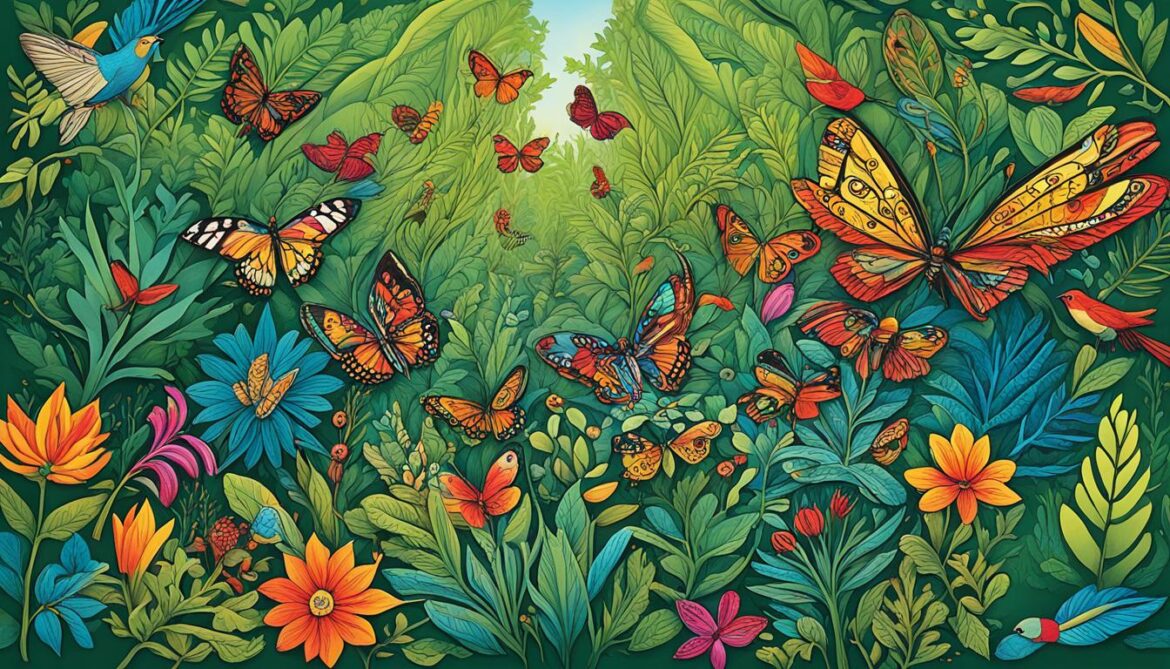
Threats to the Atewa Range Forest Reserve
The Atewa Range Forest Reserve, a crucial biodiversity hotspot in Ghana, is facing several threats that put its ecosystem at risk. The pressures of illegal logging, mining activities, and hunting not only endanger the forest’s diverse flora and fauna but also have detrimental effects on the livelihoods of local communities.
Illegal logging poses a significant threat to the Atewa Range Forest Reserve. Rampant deforestation and indiscriminate logging practices disrupt the delicate balance of the ecosystem, leading to the loss of native tree species and the destruction of wildlife habitats.
Mining activities, particularly the exploitation of bauxite deposits within the reserve, also pose a grave danger to its unique upland forests. The extraction process can result in the destruction or reduction of these ecologically significant forests, further exacerbating the loss of biodiversity.
Hunting is another critical issue that undermines the conservation efforts in the Atewa Range Forest Reserve. Unsustainable hunting practices can disrupt food chains and disturb wildlife populations, potentially driving certain species to the brink of extinction.
“The unsustainable exploitation of the Atewa Range Forest Reserve through illegal logging, mining, and hunting activities threatens the delicate balance of its ecosystems and compromises the region’s long-term environmental sustainability,” emphasizes Dr. Kwame Agyeman, a leading conservationist.
To protect the Atewa Range Forest Reserve, it is crucial to strike a balance between the exploitation of natural resources and conservation efforts. Implementing stricter regulations and enforcement against illegal logging, mining, and hunting practices is essential. The involvement of local communities in sustainable forest management and alternative livelihood options can also contribute to the preservation of this vital ecosystem.
Sustainable Management Strategies for Atewa Range Forest Reserve
The sustainable management of the Atewa Range Forest Reserve requires a multi-faceted approach that focuses on:
- Promoting sustainable logging practices
- Restricting and monitoring mining activities
- Enforcing wildlife protection laws and combating illegal hunting
- Increasing community engagement and awareness through education and alternative livelihood initiatives
- Collaborating with local and international organizations to provide technical and financial support for conservation efforts
By implementing these strategies and prioritizing the long-term protection of the Atewa Range Forest Reserve, we can safeguard its unique biodiversity and ensure the wellbeing of both the local communities and the environment.
Importance of Biodiversity Conservation in Ghana
Biodiversity conservation plays a crucial role in Ghana, providing essential ecosystem services that contribute to the well-being of the environment and local communities. Ghana’s rich biodiversity, including its diverse flora and fauna, supports sustainable development and offers numerous benefits.
One of the primary ecosystem services provided by Ghana’s biodiversity is clean water sources. The country’s forests and natural habitats act as vital watersheds, ensuring the availability of clean water for both human consumption and ecosystem functioning. Ghana’s forests also play a significant role in air purification, absorbing carbon dioxide and releasing oxygen, thereby mitigating climate change and improving air quality.
Additionally, Ghana’s biodiversity is critical for soil conservation. The intricate web of plants and organisms helps prevent soil erosion, maintaining the fertility of agricultural lands and ensuring long-term food security. The roots of trees and plants bind the soil, preventing it from being washed away by heavy rains or wind.
Climate regulation is another significant ecosystem service provided by Ghana’s biodiversity. Forests act as carbon sinks, absorbing greenhouse gases and helping to stabilize the climate. The preservation of these forests plays a vital role in mitigating climate change, reducing the impacts of extreme weather events and maintaining overall climate stability.
Biodiversity also offers economic opportunities for sustainable development in Ghana. The country’s unique flora and fauna attract tourists interested in ecotourism, promoting local economies and providing income for communities. Additionally, the availability of natural resources, such as timber and non-timber forest products, contributes to economic growth while ensuring the sustainable use of these resources.
“Conserving Ghana’s biodiversity is not only crucial for environmental protection but also for the sustainable development and well-being of local communities.”
Sustainable Development and Biodiversity
The conservation of Ghana’s biodiversity aligns with the principles of sustainable development, which aim to meet the needs of the present without compromising the ability of future generations to meet their own needs. By protecting biodiversity, Ghana ensures the longevity of ecosystem services that support human well-being and economic prosperity.
Sustainable development requires the integration of biodiversity considerations into policies and practices across various sectors, including agriculture, forestry, fisheries, and tourism. Ghana’s government has implemented policies and guidelines to promote sustainable practices in these sectors, taking into account the sustainable management of natural resources and the conservation of biodiversity.
The sustainable use and management of biodiversity contribute to the resilience of ecosystems, enhancing their ability to withstand environmental changes and disturbances. By conserving biodiversity and practicing sustainable development, Ghana can protect its natural heritage while promoting a future that is economically prosperous, socially equitable, and environmentally sustainable.
Therefore, it is essential to prioritize the conservation of Ghana’s biodiversity, recognizing the valuable ecosystem services it provides and its fundamental role in supporting sustainable development for current and future generations.
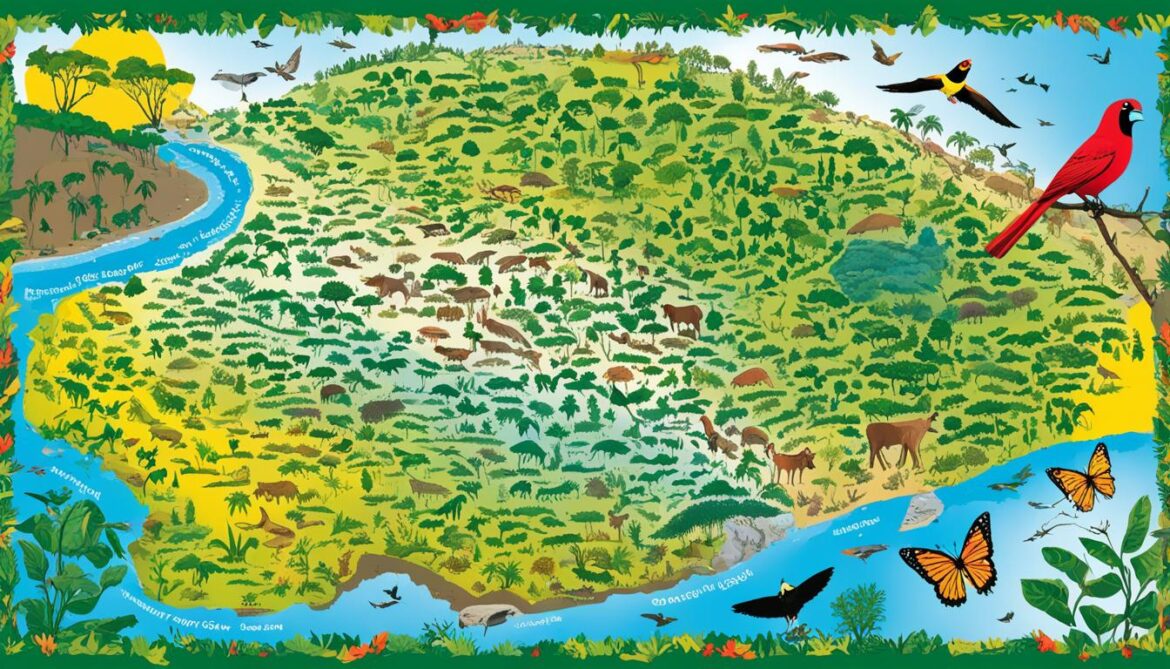
Conclusion
Ghana’s rich biodiversity is a precious natural treasure that is under threat from various challenges. However, the country’s conservation efforts are working towards protecting its diverse flora and fauna, while also promoting sustainable development for a brighter future. To ensure the effective conservation of Ghana’s biodiversity, greater coordination, research, and resource mobilization are needed.
By addressing these challenges and implementing sustainable practices, Ghana can safeguard its natural heritage and enhance the well-being of its ecosystems and communities. Conservation plays a crucial role in preserving the valuable ecosystem services that Ghana’s biodiversity provides, such as clean water sources, air purification, soil conservation, and climate regulation.
Ultimately, the conservation of Ghana’s biodiversity is essential to achieve a sustainable future. It not only protects the environment but also offers economic opportunities, such as ecotourism and the sustainable use of natural resources. With continued dedication and support, Ghana can pave the way for a harmonious coexistence between humans and nature, ensuring the long-term well-being of its biodiversity and the prosperity of its people.




